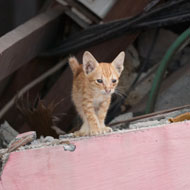
Disaster relief team providing food and vet care
A team of disaster relief experts from the charity FOUR PAWS has arrived in the Gili Islands, to help thousands of animals in the wake of devastating earthquakes.
The team has been on site helping to provide food and veterinary care to animals on the islands since the second aftershock on Sunday (19 August). Around 400 people have been killed and 350,000 displaced as a result of the crisis.
On Gili Air island, there are currently more than 100 horses running loose, posing a danger to themselves and people still living there. FOUR PAWS is currently trying to provide veterinary care and secure the scared, dehydrated and injured animals.
As motorised vehicles are not allowed on the island, the community is entirely dependent on horses for transportation.
FOUR PAWS is also working with local vets on Gili Trawangan island, to provide treatment to around 100 community cats.
The charity has organised the provision of more than three tonnes of horse food and five tonnes of cat and dog food, which will help to support the animals and their owners for the next two to three weeks.
Jackson Zee, FOUR PAWS director of disaster relief, explains: “My team was on the island during the second 6.9 aftershock and it was fearful to feel the ground shaking and see buildings collapsing.
“Still, we can only imagine how the people here feel with no homes to return to. By providing help for their animals we want to give them some time to take care of their families and slowly rebuild their lives.”
To donate to the relief effort, visit: Click here
Image © FOUR PAWS/Ardiles Rante



 The latest
The latest